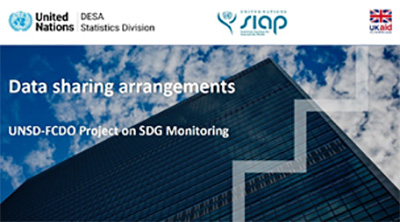National SDG monitoring arrangements
Gap assessments & developing national SDG frameworks
As a first step in the project, detailed assessment missions were conducted to assess the capacity of national statistical offices, as well as the broader statistical systems in project countries with respect to SDG monitoring. The missions, carried out between 2017-2019, produced reports detailing each global indicator's availability within the country, its feasibility of production, any additional resource requirements, and dependency on external assistance to produce the indicator. Some project countries carried out similar assessments on their own or in partnership with other actors (without project funding), resulting in all 20 countries having SDG gap assessments available.
In many countries, the assessments have been used to inform the development of national SDG indicator frameworks and SDG monitoring strategies. The vast majority of countries have established an SDG governance structure with the national statistical office, in most cases, having an established coordinating role in compiling and reporting on SDG data. Furthermore, most countries have integrated 5 the SDG monitoring requirements into their National Strategies for the Development of Statistics (NSDS) or equivalent documents.
Details of national SDG frameworks and reporting arrangements for each project country are included on the individual country webpages.
UNSD have also developed an SDG monitoring and reporting toolkit. The toolkit is developed to support national governments in the monitoring and reporting on the Sustainable Development Goals. It brings together the collective experience of United Nations entities-the funds, programmes, agencies, regional commissions and other parts of the UN Development System—in a single, easy to access page.
Data sharing
 Collaboration and data exchange between members of the NSS are both essential for comprehensive SDG monitoring. Data sharing can be a challenge in many countries, both in terms of actually agreeing to sharing and in terms of the format the data are being shared. While there was an expectation at the beginning of the project that countries would need a formal agreement or MoU to facilitate the exchange of data and metadata, many project countries have specified that formal agreements between Government agencies are not necessary, since data sharing is already regulated at a higher level by a statistics act or other legal frameworks. What is needed in most countries, however, are operational guidelines addressing the specification of which data or indicators should be shared, how often and in what format.
Collaboration and data exchange between members of the NSS are both essential for comprehensive SDG monitoring. Data sharing can be a challenge in many countries, both in terms of actually agreeing to sharing and in terms of the format the data are being shared. While there was an expectation at the beginning of the project that countries would need a formal agreement or MoU to facilitate the exchange of data and metadata, many project countries have specified that formal agreements between Government agencies are not necessary, since data sharing is already regulated at a higher level by a statistics act or other legal frameworks. What is needed in most countries, however, are operational guidelines addressing the specification of which data or indicators should be shared, how often and in what format.
To this end, to answer requests from countries, UNSD developed guidelines and a template for developing data sharing arrangements, which were disseminated to countries in the Fall of 2019. These guidelines have recently been updated and expanded upon as part of the work on MoUs under the Collaborative on the Use of Administrative Data for Statistics.
Also available are the materials from training sessions on developing data sharing agreements delivered by the UNSD-FCDO project.

